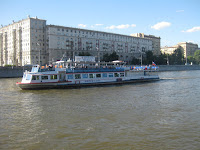Usually, I'm not eager to go on a cruise, as I might get sea sick . While on a bus or train I refrain from reading, as I might get a feeling of nausea or even dizziness.
Below is a picture taken years ago with me (covered head) and a friend, on a ferry voyage along the British channel from Dover to Callais. I had a terrible nausea followed by loss of colour in my face.
seasick in the cabin of the boat.
I've never attempted to get to the bottom of 'motion sickness' or take medicines. I 've just accepted the situation. When feeling unwell, I help myself with doing what seems the right thing to do. On a boat , I'l go to the deck for fresh air and look forward in the distance. On the bus, I'll look straight ahead or out of the window. A bottle of cold soda water may also prevent or reduce nausea.
I notice , in my case, that with age, there's significant decline in motion sickness, and that makes me glad, of course. Several years ago I went on a boat tour along the river Moskva in Moscow. Had no trouble at all.
Recently, I 've incidentally come upon an article on the above subject by James Phillips, a researcher from Washington University. He explains 'motion sickness' as a conflict between senses (visual sense of the eyes, and audial sense of the inner ear) that interferes with the brain's processing of the moving information. He calls it 'mismatch'.
As a college student he experienced seasickness ; that made him decide to search it thoroughly and may be find proper treatment someday.
In the meantime, people use a variety of more or less efficient means for preventing or stopping motion sickness, such as accupuncture wrist bands, skin patches behind the ear, herbs like ginger and chamomille, aromatherapy etc...













.jpg)
.jpg)







